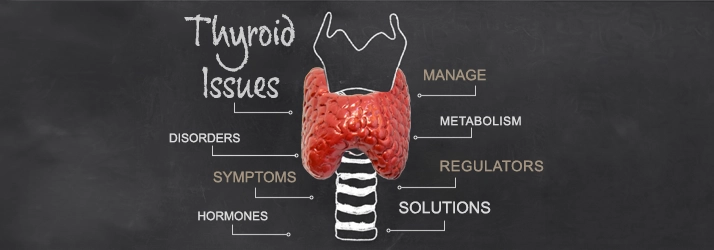Functional Medicine Approaches to Caring For Thyroid Disorders in Bloomington, IN

Thyroid disorders and thyroid dysfunction can significantly impact a person’s overall health and wellbeing. Chiropractic care in conjunction with Restorative / Functional Medicine can offer natural approaches to support the management of thyroid disorders. Our chiropractors in Bloomington, IN can help with thyroid disorders by addressing spinal misalignments that can impact the nervous system’s ability to regulate thyroid function. Misalignments in the spine can cause nerve interference, leading to imbalances in hormone production that can contribute to thyroid disorders. Chiropractic adjustments can help improve nerve function, balance hormones, and promote healthy thyroid function, ultimately supporting better overall health. Our chiropractors in Bloomington, IN also specialize in Restorative / Functional Medicine.
Functional Medicine is a holistic approach that is extremely beneficial for people with thyroid disorders in Bloomington, IN. Our Functional Medicine practitioners near you work to identify the underlying factors that contribute to thyroid disorders, such as nutrient deficiencies, food sensitivities, and imbalances in gut bacteria. By addressing these underlying factors through personalized care plans, Functional Medicine can help alleviate symptoms of thyroid disorders and support overall thyroid health. If you are struggling with thyroid disorders / thyroid dysfunction, our chiropractors who are also specialized in Functional Medicine in Bloomington, IN are here to help you naturally and holistically support your thyroid function and overall wellbeing.
Understanding Thyroid Disorders in Bloomington, IN
The thyroid gland plays a critical role in regulating metabolism, energy production, body temperature, and various physiological processes through the synthesis and release of thyroid hormones. Thyroid disorders can manifest in several forms, including:
- Hypothyroidism: Characterized by an underactive thyroid gland that produces insufficient levels of thyroid hormones (e.g., T3 and T4), leading to symptoms such as fatigue, weight gain, cold intolerance, dry skin, constipation, depression, and cognitive impairment.
- Hyperthyroidism: In contrast, hyperthyroidism results from an overactive thyroid gland that produces excessive amounts of thyroid hormones, causing symptoms such as weight loss, rapid heartbeat, heat intolerance, sweating, anxiety, tremors, and insomnia.
- Thyroid Autoimmunity: Autoimmune thyroid conditions, such as Hashimoto's thyroiditis and Graves' disease, occur when the immune system mistakenly attacks the thyroid gland, leading to inflammation, tissue damage, and alterations in thyroid hormone production.
Bloomington, IN Functional Medicine Approach to Thyroid Issues
Functional medicine takes a comprehensive and individualized approach to diagnosing and caring for thyroid disorders, focusing on addressing underlying imbalances, optimizing thyroid function, and restoring overall health. Here's how functional medicine approaches thyroid issues:
- Comprehensive Assessment:
Functional medicine practitioners conduct thorough evaluations to assess thyroid function, identify potential root causes of thyroid dysfunction, and evaluate overall health status. This may involve reviewing the patient's medical history, performing specialized laboratory tests to measure thyroid hormone levels (e.g., TSH, T3, T4), thyroid antibodies (e.g., anti-TPO, anti-TG), and assessing factors such as nutrient deficiencies, gut health, adrenal function, and immune system function. - Identifying Root Causes:
Rather than focusing solely on managing symptoms, functional medicine seeks to identify and address the underlying root causes of thyroid dysfunction. These may include factors such as:- Nutrient Deficiencies: Inadequate intake or absorption of essential nutrients such as iodine, selenium, zinc, vitamin D, and iron can impair thyroid hormone synthesis and function.
- Gut Imbalances: Dysbiosis, intestinal permeability (leaky gut), and gut infections can disrupt thyroid function, trigger autoimmune reactions, and contribute to inflammation.
- Adrenal Dysfunction: Chronic stress, adrenal fatigue, and dysregulated cortisol levels can impact thyroid function and exacerbate symptoms of thyroid dysfunction.
- Environmental Toxins: Exposure to environmental toxins such as heavy metals, pesticides, plastics, and endocrine-disrupting chemicals (EDCs) can interfere with thyroid hormone production and metabolism.
- Immune Dysregulation: Autoimmune thyroid conditions, such as Hashimoto's thyroiditis and Graves' disease, involve immune system dysfunction and require targeted interventions to modulate immune responses and reduce inflammation.
Individualized Care Plans
Based on the findings of the assessment, functional medicine practitioners develop personalized plans tailored to the unique needs of each patient. These plans may include a combination of dietary and lifestyle modifications, targeted supplementation, hormone replacement therapy (if necessary), stress management techniques, detoxification protocols, and supportive therapies to address underlying imbalances and restore thyroid health.

Functional Medicine Interventions for Thyroid Health:
Functional medicine employs various interventions to support thyroid function, address underlying imbalances, and promote overall health and well-being. Some key strategies include:
- Nutritional Support: Functional medicine emphasizes the importance of nutrient-dense foods that provide essential vitamins, minerals, and antioxidants necessary for thyroid health. This may include foods rich in iodine (e.g., seaweed, seafood), selenium (e.g., brazil nuts, sunflower seeds), zinc (e.g., pumpkin seeds, oysters), vitamin D (e.g., fatty fish, fortified dairy), and iron (e.g., lean meats, leafy greens).
- Dietary Modifications: Functional medicine recommends dietary modifications to support thyroid function and reduce inflammation. This may involve adopting an anti-inflammatory diet rich in whole, unprocessed foods, emphasizing fruits, vegetables, lean proteins, healthy fats, and fiber, while minimizing refined sugars, processed foods, gluten, and potential food allergens.
- Gut Health Optimization: Since gut health plays a crucial role in immune function, inflammation, and nutrient absorption, functional medicine focuses on optimizing gut health to support thyroid function. This may include addressing gut dysbiosis, leaky gut syndrome, and gut infections through dietary modifications, probiotics, prebiotics, and gut-healing nutrients.
- Stress Management: Chronic stress can negatively impact thyroid function and exacerbate symptoms of thyroid dysfunction. Functional medicine incorporates stress management techniques such as mindfulness, meditation, yoga, deep breathing exercises, and relaxation techniques to support adrenal health, balance cortisol levels, and promote overall well-being.
- Hormone Balancing: In cases of thyroid hormone imbalances, functional medicine may recommend hormone replacement therapy (e.g., synthetic or natural thyroid hormones) to restore thyroid function and alleviate symptoms. This therapy is often combined with nutritional support, lifestyle modifications, and adrenal support to optimize the outcomes.
- Detoxification Protocols: Functional medicine utilizes detoxification protocols to support the body's natural detoxification pathways and eliminate environmental toxins that may interfere with thyroid function. This may involve dietary interventions, targeted supplementation (e.g., glutathione, N-acetylcysteine), hydration, sweating therapies (e.g., sauna, exercise), and liver support to enhance toxin elimination.
- Immune Modulation: For individuals with autoimmune thyroid conditions, functional medicine focuses on modulating immune responses, reducing inflammation, and promoting immune tolerance to prevent further thyroid tissue damage. This may involve dietary interventions (e.g., gluten-free, anti-inflammatory diet), supplementation (e.g., omega-3 fatty acids, vitamin D), stress reduction techniques, and autoimmune protocols to address underlying immune dysfunction.
Monitoring and Follow-Up:
Functional medicine practitioners monitor patients closely throughout the process, assessing thyroid function, symptom improvement, and overall health status. Follow-up evaluations may include repeat testing of thyroid function (e.g., TSH, T3, T4, thyroid antibodies), nutrient levels, adrenal function, and inflammatory markers to track progress and adjust care plans as needed. Additionally, ongoing support, education, and empowerment are provided to help patients manage their thyroid health effectively and promote long-term wellness.
Functional medicine offers a comprehensive and personalized approach to caring for thyroid issues, focusing on identifying and addressing the underlying root causes of thyroid dysfunction while restoring overall health and vitality. By integrating dietary and lifestyle modifications, targeted supplementation, hormone balancing therapies, stress management techniques, and detoxification protocols, functional medicine empowers individuals to reclaim their thyroid health and optimize their well-being. Whether managing hypothyroidism, hyperthyroidism, or autoimmune thyroid conditions, functional medicine at Paragon Wellness Center in Bloomington, IN provides a roadmap for addressing the complexities of thyroid health and promoting
OFFICE HOURS
Monday
9:00am - 1:00pm
3:00pm - 6:00pm
Tuesday
3:00pm - 6:00pm
Wednesday
9:00am - 1:00pm
3:00pm - 6:00pm
Thursday
9:00am - 1:00pm
3:00pm - 6:00pm
Friday
9:00am - 1:00pm
3:00pm - 6:00pm
Saturday & Sunday
Closed
Paragon Wellness Center
1332 W Arch Haven Ave Ste C
Bloomington, IN 47403



